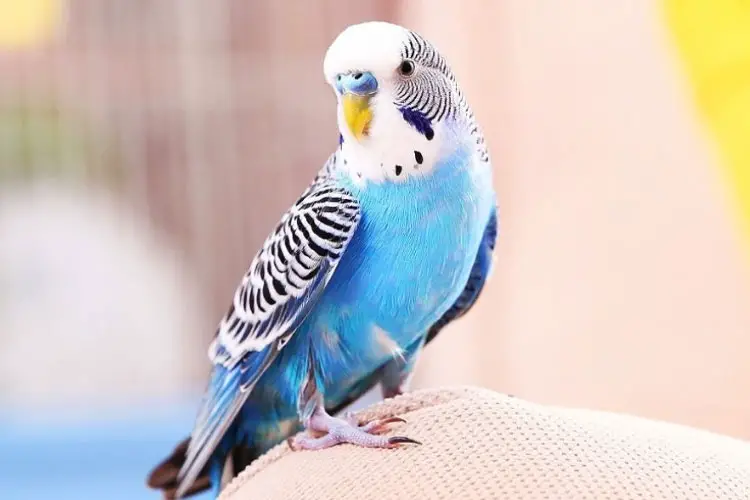Budgies, also called parakeets or budgerigars, are very social and make great pets. As a budgie owner, you will often notice when it behaves abnormally. You should also know habits that the budgie displays when it is sick or uncomfortable.
Why does my budgie keep opening its mouth? A budgie’s mouth open could be a sign of an illness such as a sore throat. It could also indicate that something is stuck in its throat or the budgie is trying to regurgitate. If a budgie is nervous or trying to thermoregulate, it will open its mouth (panting).
This article will cover reasons why budgies keep their mouths open, how to know that a budgie is stressed and what to do when your budgie keeps opening its mouth.
Why Does My Budgie Keep Opening Its Mouth
There are several reasons why a budgie keeps opening its mouth. Some reasons are harmless, but other reasons require medical attention. The reasons include;

Thermoregulation
Parakeets, like all birds, do not have sweat glands. They lose heat through panting. So if it is hot, you will likely find your budgie’s mouth open. Also, if your budgie engages in strenuous exercise, its body temperature rises, opening its mouth to cool itself.
Try to keep a budgie’s environment at 70 degrees celsius-avoid extremes such as too hot or too cold.
Regurgitation
When a budgie regurgitates, it bops its head up and down to move food from its crop to its mouth. During the regurgitation process, parakeets keep their mouths open and stretch out their necks to push food into their mouths.
Regurgitation happens when a female budgie wants to feed its chicks or when a budgie wants to attract a mate. The budgie spews out undigested crop food, which deposits in another budgie’s mouth.
Eating
If you walk in when your budgie is trying to chew its food, you will notice it has its mouth open so it can chew the food. Also, if something gets stuck in the budgie’s throat, it will open its mouth and try to remove the stuck food from its throat or crop.
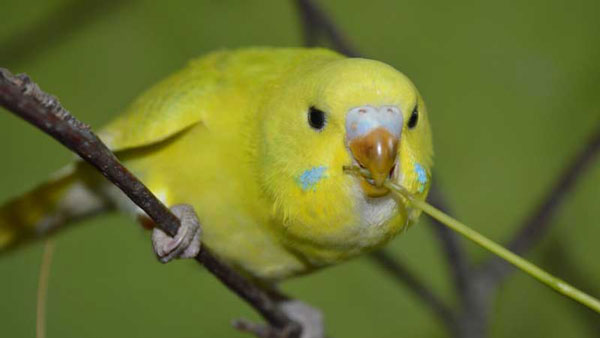
Respiratory infections or other ailments
Budgies have particularly thin lung membranes and are susceptible to viral infections and bacterial and fungal infections. An example of a fungal infection is aspergillosis. It affects the budgie’s lungs, sinuses, and nose. Thrush is an example of a bacterial infection that affects the budgie’s throat and crop.
Respiratory infections often lead to mucus build-up and a sore throat which could lead to the parakeet keeping its mouth open.
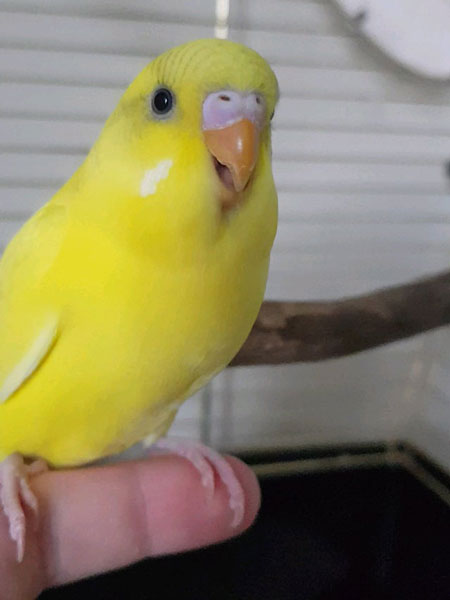
Signs That Your Budgie Is Unwell
- Loss of appetite and loss of weight
- Trouble breathing or panting
- Wheezing sound when breathing
- Nasal congestion
- Fluffed feathers
- Watery eyes or swelling around the eyes
- Sluggishness
- Lethargy and change in vocalizations
- Sneezing
Vomiting
When a parakeet is trying to vomit, it will keep opening its mouth in an attempt to expel its stomach contents. You should take vomiting seriously because it indicates an underlying issue.
Stress
When a budgie is stressed, nervous or anxious, it will often open its mouth. Parakeets will open their mouths to seem more intimidating to predators, mainly if the budgie is in a new environment.
Budgies could also be stressed because of boredom, an overly crowded cage, or sudden loud noises.
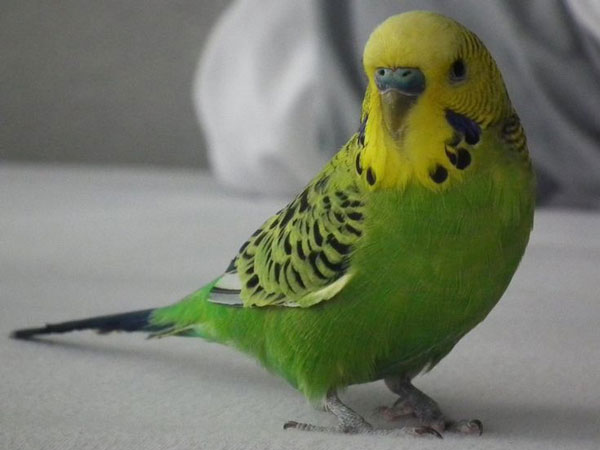
Also read: How to Comfort a Dying Budgie?
Preening
Preening is budgie’s way of grooming. You will notice that your budgie sometimes pecks on its feathers to remove dirt or food stuck on its feathers. After preening, the budgie opens its mouth to readjust its crop and remove feathers that might be stuck in its throat.
Thirst and hunger
A thirsty and hungry parakeet will open its mouth due to dehydration. Dehydration can be caused by strenuous exercises, feeding your budgie dry food, or overheating.
Talking
When practicing how to talk, budgies often open their mouths to form certain words. You will hear clicking sounds as the budgerigar opens its mouth.
Yawning
When a budgie is tired, sleepy, or in a hot room, it yawns, which involves opening its mouth. The parakeet will also stretch its wings and neck. Yawning is nothing to be worried about, but if it is happening consistently, there is an underlying issue.
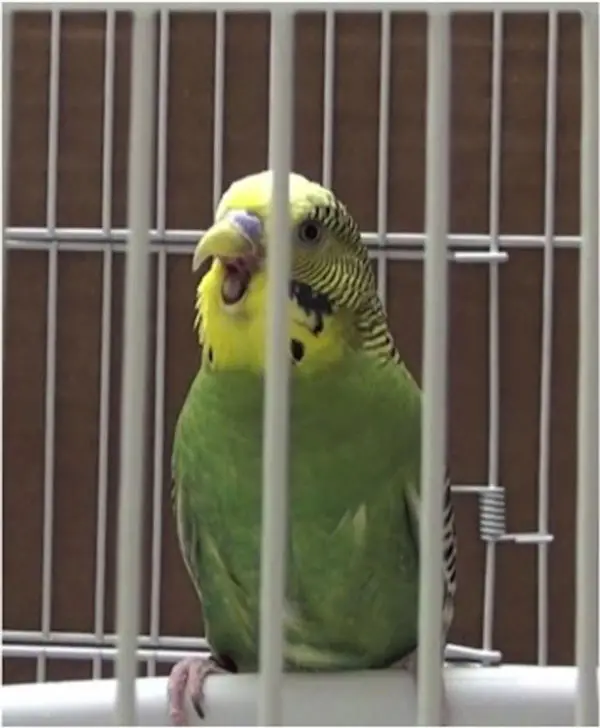
How Do I Know My Budgie Is Stressed
Here are several ways of knowing whether your bird is stressed.
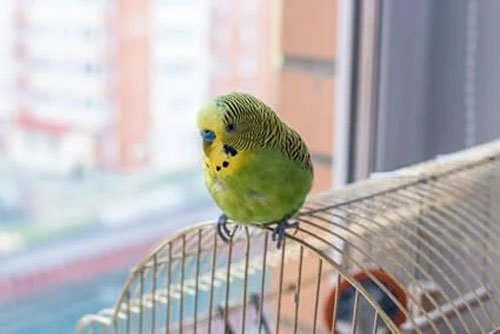
Feather plucking
A stressed budgie will often pluck its feathers to show distress. Feather plucking is dangerous because the budgie can dig into its skin, causing harm to itself.
Change in mood
Stress can cause parakeets to become aggressive towards other budgies or their owners. The budgie will fly restlessly inside the cage, bite, or scream excessively due to stress.
Sidebars
Sidebars are horizontal lines that run across a parakeet’s feathers when stressed. These lines are the only physical indication of stress in budgies.
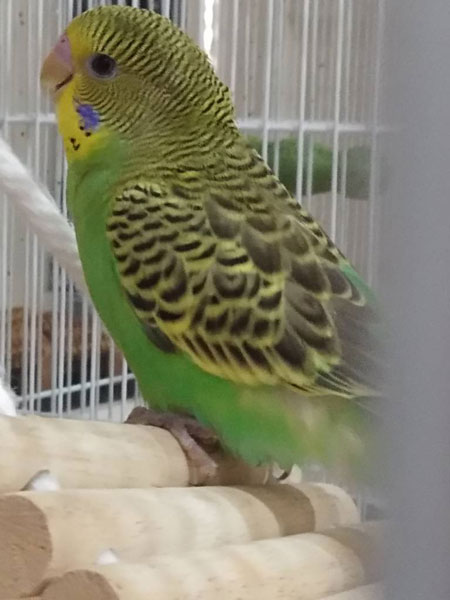
Panting
A budgie could be stressed due to fear, making it pant and breath heavily with its mouth open. If your budgie’s cage is near a dog’s or cat’s resting place, the budgie will feel nervous because it views the other pets as predators.
Loss of appetite
The budgie tends to avoid eating when it is stressed. Stress causes the budgie to feel uneasy and unsafe, and when eating, budgies feel very vulnerable, so they avoid eating to keep alert.
Boredom
Birds require mental stimulation to keep them engaged. When birds are bored, they often become stressed and might start plucking out their feathers or becoming agitated.
Repetitive behavior
A stressed parakeet will often tap its toes, pace back and forth, knock on toys or food bowls e.t.c
What Do I Do If My Budgie Keeps Opening Its Mouth
The first thing you should do when your budgie keeps opening its mouth is examine why the budgie is opening its mouth.
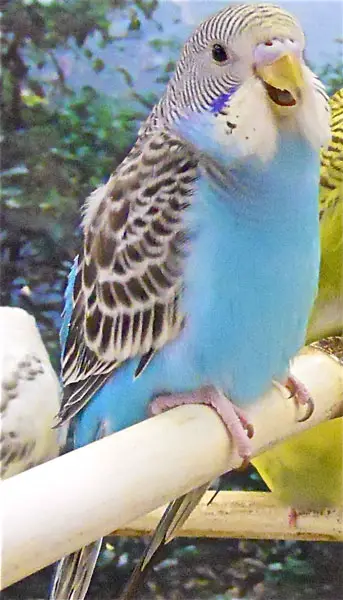
- If it is due to high temperature, ensure you move the budgie to a cooler room and gradually mist its wings with cool water.
- If your budgie opens its mouth due to an illness, ensure you take it to a veterinarian so the vet can administer antibiotics.
- If the budgie seems stressed, try and pinpoint what could be stressing it and correct the situation. Stress can kill a budgie, so do not overlook it.
- Ensure your budgie is in a quiet and conducive environment and away from pets like cats or dogs. This will give your budgie a sense of security.
- Provide toys and puzzles inside the budgie’s cage, so it does not feel bored.
- Cage cleanliness; ensure you clean the budgie’s cage to eliminate pests such as mites that could infest your budgie and cause stress and discomfort.
- Provide a balanced diet and fresh water for your budgie; thirst and hunger can make budgies open their mouths.
- To prevent your budgies from having allergies, ensure your budgie’s cage is not near dusty places and there are no strong-smelling chemicals nearby.
Related Questions
Here are other frequently asked questions.
Your budgie might be trying to talk to you. When budgies are practicing how to talk, they often open and close their mouths while producing clicking sounds. Some budgie owners say their budgies open and close their beaks when trying to ‘whisper.’
Baby birds keep their beaks open when hungry. The mother bird will go forage for food and come back, chew the food, and regurgitate it into its chick’s mouth. The baby birds could also be thermoregulating.
Related: My Budgie Escaped, Will It Survive Alone?
Conclusion
When a budgie opens its mouth, it is not always a cause for alarm. It could only be thermoregulating, regurgitating, or yawning. However, on the hand, it can be due to illness, stress, or hunger.
Any budgie parent needs to know how to identify the positive and negative reasons. I hope I have helped with the question- why does my budgie keep opening its mouth?
